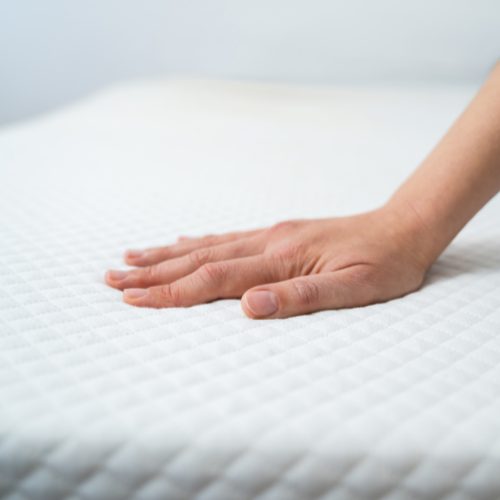Top 5 Tips to Find the Best Mattress for Arthritis UK: An Informational Guide to Pain-Free Sleep

Living with arthritis can be a challenge, particularly when it comes to getting a good night's sleep. Pain and discomfort can often lead to restless nights, making it imperative to find the right mattress tailored to your needs. Understanding this, we have created an informational guide to help navigate the maze of choices available.
In this guide, we provide practical advice, covering critical aspects from the importance of support and comfort to the significance of warranties, all to help you take a step towards restful, pain-free nights with the best mattress for arthritis UK. Let's dive into these top tips to assist you in making an informed decision.
How to Find the Best Mattress for Arthritis UK


Finding the right mattress can significantly enhance your sleep quality, especially when dealing with arthritis. Here are the top 5 tips to help you find the best mattress for arthritis in the UK:
1. Prioritise Support and Comfort
The perfect mattress for arthritis sufferers should strike a balance between comfort and support. It should be firm enough to keep your spine and joints well-supported while remaining soft enough to mould to your body's natural curves. This balance aids in relieving pressure where it's most needed.
2. Consider the Material
Consider mattresses made from materials known for their pressure-relieving properties. Memory foam mattresses and hybrid mattresses, which combine innerspring with either latex or memory foam layers, are popular choices due to their ability to distribute your body weight evenly. This results in pressure relief and enhanced spinal alignment which can significantly reduce arthritis-related discomfort and improve your overall sleep experience.
3. Remember that Comfort is Personal
It's important to remember that comfort is a personal matter. A mattress that one person finds comfortable may not work for someone else. Therefore, factors such as your preferred sleeping surface, sleep position, body weight, and individual comfort preferences are essential when choosing your mattress. For patients with a larger body weight, bariatric mattresses are an ideal choice.
Your preferred sleeping position plays a critical role in determining the right mattress firmness. Side sleepers often do well with a slightly softer mattress that can cushion the shoulders and hips. In contrast, back or stomach sleepers might require a firm mattress to prevent their hips from sinking too far into the soft mattress, maintaining proper spinal alignment.
4. Temperature Regulation
Temperature regulation is another aspect worth considering. Some people with arthritis find their symptoms worsen with heat, making breathable airflow mattress a perfect solution for arthritis sufferers. They can help maintain a comfortable sleep environment, while preventing pressure ulcers and further improving the quality of your sleep.
5. Don't Overlook the Warranty
A good mattress is an investment, and you'll want to make sure that your investment is protected. Look for mattresses that come with a comprehensive warranty. This not only gives you peace of mind but is also a sign that the company stands behind its product.
Top Tips for Better Sleep for Arthritis Sufferers


Living with arthritis can sometimes make a good night's sleep seem like a distant dream. However, there are strategies to tackle this issue head-on. Here are some effective tips that can lead to improved sleep for those battling arthritis:
- Invest in a Quality Mattress: As previously discussed, choosing the right mattress can be a game-changer. Look for a mattress that balances comfort and support, aids in pressure relief and promotes proper spinal alignment. Memory foam or hybrid mattresses are often excellent choices for arthritis sufferers. Consider renting a mattress before purchasing if you aren't sure what type would be most suitable for your needs.
- Maintain a Regular Sleep Schedule: Going to bed and waking up at the same time every day, including weekends, can help regulate your body's internal clock and improve your sleep quality. It might be tempting to sleep in on weekends, but consistency is key.
- Consider Sleep-Enhancing Products: Aside from a good mattress, other sleep products can improve comfort. Consider ergonomic pillows that support your neck and head, or mattress toppers that can add an extra layer of cushioning.
- Stay Active: Regular physical activity can help reduce arthritis pain and improve sleep. However, avoid vigorous workouts close to bedtime as they can interfere with sleep.
- Mind Your Diet: Some foods and drinks can interfere with sleep. Try to avoid caffeine and alcohol close to bedtime. Also, eating a large meal right before bed can cause discomfort and disrupt sleep.
- Try Relaxation Techniques: Practices such as meditation, deep breathing, or gentle yoga before bed can help relax the mind and body, promoting better sleep.
- Consult a Healthcare Professional: If pain is significantly interfering with your sleep, it might be time to consult a healthcare professional. They can recommend suitable treatments, including medications, physiotherapy, or lifestyle changes.
Arthritis doesn't have to spell the end of good sleep. By adopting these strategies, arthritis sufferers can improve their sleep quality and, in turn, their overall quality of life. Remember, everybody is unique, so it may take some experimenting to find what works best for you.
Conclusion
Finding the best mattress for arthritis in the UK doesn't have to be a daunting task. By keeping in mind these top five tips in mind you can make an informed decision towards achieving pain-free sleep.
It's important to remember that everyone's experience with arthritis is unique, so take your time to find what works best for you. After all, a good night's sleep is not just a luxury, but a vital component of managing arthritis and improving your overall quality of life. Don't hesitate to contact our team of experts at Shelden Healthcare, they will be happy to help you choose the perfect mattress for your needs!
Frequently Asked Questions


What is arthritis?
Arthritis is a common health condition characterised by inflammation and pain in one or more joints of the body. The two most common types of arthritis are osteoarthritis and rheumatoid arthritis.
Osteoarthritis typically affects weight-bearing joints like the hips, knees, and spine. It occurs when the protective cartilage at the ends of your bones wears down over time, causing the bones to rub against each other, leading to pain and stiffness.
On the other hand, rheumatoid arthritis is an autoimmune disorder where the body's immune system mistakenly attacks its own tissues, particularly the lining of the joints. This results in inflammation, chronic pain and swelling that can eventually damage the joint and other parts of the body.
Symptoms of arthritis usually develop over time but may also appear suddenly. They include joint pain, swelling, stiffness, and decreased range of motion, which can vary in severity from mild to crippling. There's currently no cure for arthritis, but various treatments can help manage symptoms and improve quality of life. This includes medication, physiotherapy, lifestyle modifications, and in some severe cases, surgical procedures.
How does a good mattress help with arthritis?
A good mattress can significantly help manage arthritis symptoms by providing support and cushioning for pressure points such as hips, shoulders, and knees. It can improve spinal alignment and distribute body weight evenly, reducing strain on joints. Additionally, a quality mattress can enhance sleep quality, vital for the body's healing and recuperation process.
How often should an arthritis sufferer replace their mattress?
The general recommendation is to replace your mattress every 7-10 years. However, this can vary depending on the quality of the mattress and whether it continues to provide the necessary support and comfort. Arthritis sufferers should consider replacing their mattress if they notice increased discomfort or if the existing mattress shows signs of wear and tear, such as sagging.
Can a mattress topper help with arthritis symptoms?
Yes, a mattress topper can provide an added layer of cushioning and support, which can help alleviate arthritis symptoms. Particularly, memory foam toppers can offer pressure relief and improve the comfort level of your current mattress.
However, a topper is a temporary solution and won't fix underlying issues with an old or unsupportive mattress. It's also important to note that not all toppers are the same, so arthritis sufferers should choose one that fits their specific needs and preferences.








